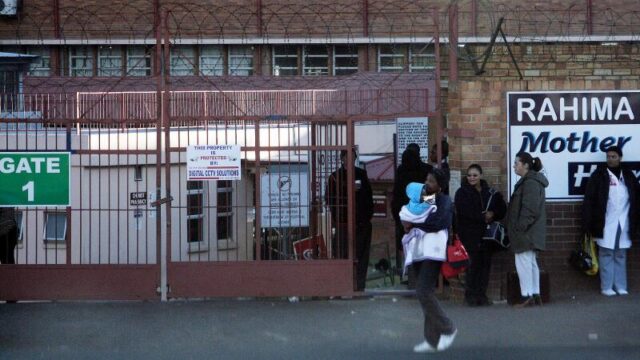The Health Ombud, Professor Malegapuru Makgoba, has handed over his report on service delivery issues at the hospital after a year-long investigation into the facility’s challenges.
THE RAHIMA Moosa Mother and Child Hospital (RMMCH) report has confirmed the veracity of news reports claiming that mothers were made to sleep on the floor of the maternity hospital in Coronationville, Johannesburg.
This was disclosed by the Health Ombud, Professor Malegapuru Makgoba, who, following a year-long inquiry into the facility’s concerns, handed up his report on service delivery issues at the hospital.
Minister of Health Dr Joe Phaahla and Gauteng Health MEC Nomantu Nkomo-Ralehoko have accepted the official findings, with the hope of solving some of the challenges at the facility.
“Unsafe, unclean, and unhygienic” were mentioned a number of times during the probe.
“We interviewed 34 people at the hospital, and three words came up: dirty, unhygienic and unsafe. These are common words we picked up during the investigation,” Makgoba said.
Documentary, video and in-person evidence as well as human resource records were collected during the course of the investigation. Makgoba said conditions at the hospital had deteriorated because of overcrowding, neglect, and decaying infrastructure.
He said the current MEC had inherited a mess due to the years of neglect of the facility, which continued to operate without a blood laboratory, an ICU or effective security personnel, leaving patients and staff feeling unsafe.
Some of the findings from the investigation suggested that the hospital’s problems included sewage spillages, heating issues, peeling paint and other infrastructural challenges, on top of inadequate administrative and managerial issues.
“We found that it was true that pregnant mothers were sleeping on the floor. Almost all the people we interviewed confirmed that this was the case and that the CEO did not spend enough time at the hospital. She had provided that information to the previous MEC,” Makgoba added.
Additional findings revealed that there were several lapses in the appointment of CEOs in Gauteng.
“The criteria for CEOs has to be unquestionable, but here in Gauteng they have lowered the criteria for appointing CEOs. In fact, the province has a problem with CEOs that other provinces do not have,” he said.
He said the hospital was a high-risk, specialised facility but did not have an ICU or a blood laboratory, and its only CT scanner was faulty.
“You can’t run such a hospital without a dedicated blood laboratory in this day and age. The hospital only has one CT scanner that is not functioning, and they also have security challenges. Cars have been stolen, and staff have been mugged at the hospital … There is also a shortage of security and nursing staff,” he said.
The report also revealed that more than 40% of the patients were not South African citizens, which had put a strain on the hospital as it had to service the growing number of patients coming through the borders, sometimes without the right documents.
To prevent lapses, several recommendations were made, including the implementation of strict recruiting standards for CEOs and the prioritisation of infrastructure development above maintaining a decaying facility.
“We have recommended that Rahima Moosa Mother and Child Hospital be prioritised for infrastructure. We should ensure that the hospital is gazetted as a tertiary hospital and try to establish an ICU. Otherwise, we will have a hospital in the heart of South Africa without an ICU and no laboratory,” Makgoba added.
Phaahla said the investigation would allow the Health Department to improve the health and safety of patients and the provision of services to the growing number of mothers who relied on the facility.
“We note the issues raised in the complaint and the breaches substantiated by your investigations, in particular on the dignity and well-being of pregnant women as they were expected to sit on plastic chairs in the prenatal ward while awaiting delivery and sleep on the floor due to overcrowding.
“Secondly, the ageing infrastructure and sewage reticulation system that are failing, leading to pipe spillage and toilet blockages; the inadequacy of security with no access control measures to monitor entry and exit at the hospital and the failed human resource policy and system both in the hospital and the provincial health sector,” said the minister.
“Rahima Moosa cannot escape this pressure, however, this should have necessitated infrastructure refurbishment and upgrades to expand the capacity of the hospital. The human resource policies and systems are dynamic areas of management that require continuous appraisals to suit contemporary demands.”








